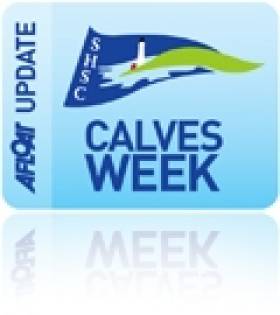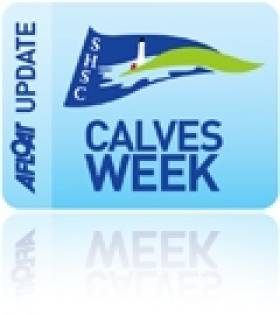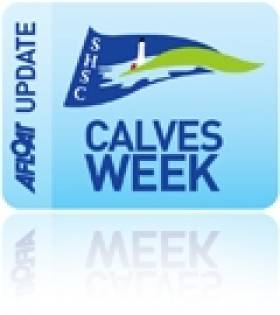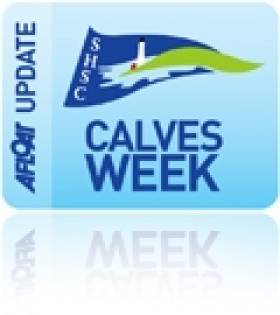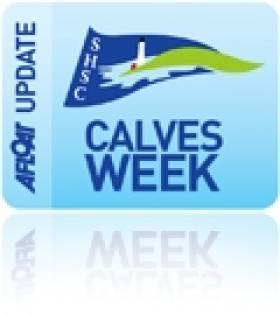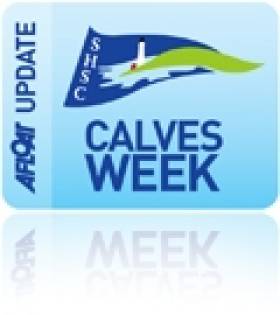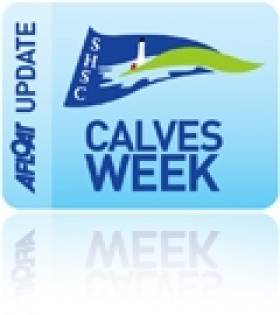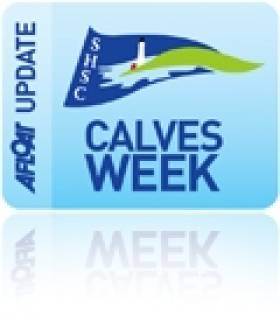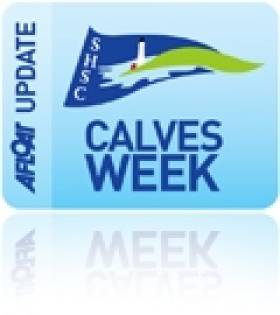Displaying items by tag: Calves Week
Calves Week 2011 Notice of Race and Entry form Published
'Gloves Off' Wins Calves Week Regatta Cup
the start line moved outside the harbour the fleets took in both the Goat and Calve Islands together with the marks off Castle Island.
In Class Zero IRC Kieran Twomeys "Gloves Off" finished a brilliant week of sailing to take the Regatta Cup and also the overall trophies in both handicap divisions, while Schull Sailing Club Commodore Morgan O' Donovan's "Loco" won the Regatta Echo cup.
In Class One IRC the overall result went right down to the wire with victory in the final race giving Donal O Leary's "D Tox" the title after a six points tie break with Simon Coveney s "Wavetrain". D Tox finished a very successful weeks racing by also winning the Echo overall trophy.
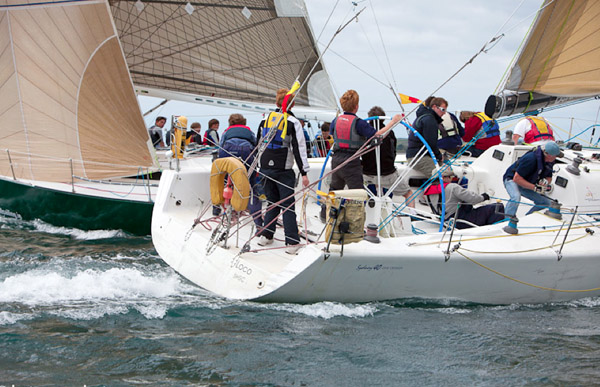
Infinity and Beyond (left) and Loco on opposite tacks. Photo: Bob Bateman. More photos on the gallery here
Competition was also intense in Class Two IRC with Conor Ronan's "Ruthless" just edging out the Deasey/Ivers/Desmond crew in "Bad Company" for the overall trophy thanks to his better last race result, while in Echo a third place in the regatta race, behind Andrew Mackeys "Lornadrew" was good enough to win the overall for John McGowan's "Mackey G".
The overall in Class Three IRC was never in doubt with David Kenefick in "Tiger" scoring five bullet , while a third in the final race for Paul Murrays "Full Pelt" saw him claim the Echo overall.
In Class Four the Hanley Brothers in "Saoirse" finished off a productive weeks racing by winning the IRC regatta cup and the overalls in both handicap divisions with Una Buckley sailing "Tete-a-Tete to victory in Echo.
In the White Sail One fleet the Don McCarthy sailed VSOP won the regatta race, while a third place for Bryan Heffernans "Aisling" was good enough for
him to clinch the overall trophy. In White Sail Two Tadgh Dwyer's "Brazen Huzie" won the overall, having discarded the regatta result which saw Frank
Murphys "Dreamcatcher take the trophy.
The McMahon trophy for best local boat went to Paul Murray's "Full Pelt" while the Pearson "Spirit of the regatta trophy "was presented to Bill Rigney.
Donal O'Leary Continues Winning Run in Roaring Water Bay
For Thursday's Inter Island race series Race Officer Neil Prendeville sent the fleets on a long course around many of the scenic marks in Roaring Water Bay writes Claire Bateman. The arrival of the forecasted rain late in the afternoon resulted in the westerly wind dropping off to a gentle breeze, necessitating the shortening of the Class Two and White Sail One courses after five hours of sailing. In class zero Kieran Twomey's "Gloves Off" showed a clean pair of heels to the rest of the fleet, by comfortably winning both IRC and Echo with"Crackerjack" and "Infinity" in second and third. In class one, Donal O'Leary continued his run of good results in winning both divisions with Simon Coveney's "Wavetrain" second in IRC and Derry Good's "Exhale" second in Echo.
The Royal Cork dominance continued in Class Two where the Desmond, Ivers, Deasy trio in "Bad Company" captured both trophies, with Conor Ronan's "Ruthless" second in IRC and John Mc Gowan's"Mackey G" filling second place in Echo. In Class Three IRC David Kenefick's Quarter Tonner,"Tiger" is proving to beunbeatable, while Paul Murray in "Full Pelt" had a slender ten second advantage in Echo .In Class Four, Richard Hanley in "Saoirse" led his family crew to victory inboth handicap divisions ahead of "Shelly D" in IRC and "Witchcraft" in Echo.In the White Sail One class Frank Whelan added another win to his recentstring of victories with Don McCarthy's "VSOP" in second and Julian Dockery's "Flying Fox" in third, while in White Sail Two it was a cleansweep for local Schull boats with Frank Murphy's "Dreamcatcher" taking thetrophy ahead of Paul and David Kiely sailing their Norfolk Smuggler "Cu NaMara" and the Crowley family in "La Perle Noire".
Royal Cork Boats Perform at Calves Week
Summer weather finally returned to Schull on Tuesday with a fresh westerly breeze. All fleets sailed a course taking in the Calf Islands and Goat Island as a weather mark.
In Class Zero L. J. Mc Mahon of the Killyeagh YC sailed 'Crackerjack' to victory in both divisions, helped by the retiral of 'Loco' with sail damage and 'Gloves Off' who had a brush with the Middle Calves reef fortunately without sustaining damage.
In Class One IRC Simon Coveney's 'Wavetrain' recovered from a poor start to take the Costal Trophy ahead of Donal O Leary's 'D Tox', who also had to
settle for second in Echo behind Derry Goods 'Exhale.
In Class Two, it was a clean sweep in both divisions for the Applebe family in 'Cochise, with 'Bad Company' second in IRC and Andrew Mackey's 'Lornadrew' filling second place in Echo.
In Class Three David Kenefick continued his impressive run in "Tiger" to win IRC from Paul Murray's 'Full Pelt, with Murray taking the Echo division ahead of Padraig O'Donovan's 'Chameleon'.
In Class Four the fresh conditions ideally suited Mark and Michelle Murphy in 'Shelly D"'who captured both trophies from the Hanley brothers in
'Saoirse'.
In White Sail One Bryan Heffernan in 'Aisling' notched up another win from Brian Siggens' 'Aris Maria', while Julian Dockery's 'Flying Fish' required the assistance of the inshore lifeboat service when stranded on the reef southeast of the Middle Calf Islands.
White Sail Two saw the prizes go to local boats, with the Crowley family sailing 'La Perle Noire' to victory ahead of Hugh O Donnell and crew in 'Aoife' and Tadgh Dwyers 'Brazen Huzie'.
Coveney's Comprehensive Victory at Baltimore Regatta
A light westerly breeze of eight to ten knots arrived in time for the start of Baltimore regatta on Bank holiday Monday. Race Officer Neil Prendeville sent the various fleets on a course through the Gascanane Sound and around the Calve Islands. The inclusion of the Amelia Buoy as a windward mark caused the race officers some anxious moments when the Irish Lights vessel 'Granuaile' lifted the mark during a routine maintenance operation just as the fleet appeared south of the Calves. However, the slow progress of the racing yachts allowed enough time to complete the operation, and the resulting spinnaker run back to Baltimore created a spectacular colourful background in Roaring Water Bay.
In Class Zero IRC Northern Ireland entry 'Crackerjack' scored her first victory of the regatta when owner L.J. Mc Mahon claimed the Regatta Cup. In Echo a fully crewed 'Loco' gave Schull Commodore Morgan O' Donovan the first local win of the regatta..
In Class One IRC Simon Coveney's 'Wavetrain' had a comprehensive victory over Ian Nagle's 'Jelly Baby'while in Echo Donal O'Leary's 'D Tox' took the spoils.
In Class Two IRC Conor Ronan's Corby 26 'Ruthless' had thirteen seconds to spare over Bad Company, while in Echo the Dann/Murphy duo in 'Val Kriss' had an equally narrow victory over the Appelbe family in 'Cochise'.
In Class Three IRC David Keneficks 'Tiger'held off a strong challenge from Cove sailing Clubs 'Bedlam',while in Echo victory went to long time event supporter Padraig O'Donovan of KYC sailing 'Chameleon'.
In Class Four the Hanley brothers in 'Saoirse' claimed victory in both divisions ahead of "Chinook" in IRC and Tete-A-Tete in Echo.
In a highly competitive White Sail One class Frank Whelans 'Blow Wind Blow' had a comfortable win over Donal Heffernans 'Aisling', while in White Sail Two the trophies went to local boats with Kieran Dwyer's 'Brazen Huzie' snatching victory from Dave Waters' 'Genevieve'.
Victory in the large 1720 class went to 'Smile'n Wave' ahead of 'Malarky' and Two to Tango.
Spinnaker Run to Calves Week
The race continued to Schull where Donal O'Learys 'D Tox' took line honours finishing shortly after 7am. With numerous requests for redress, the race committee had a busy time sorting Class One results, which resulted in 'D Tox' taking first in both IRC and Echo, with Exhale and Saxon Senator filling second and third.
The spoils were shared in Class Two With Kieran O Briens 'Magnet' taking the IRC trophy, with the Barrett/Conlon team in 'Y Knot' winning Echo.
In the combined Classes Three and Four dogged determination finally paid off for Eddie Higgins and the crew of La Maraquita who, sailing the smallest boat in the race, crossed the Schull line in an elapsed time of sixteen and a half hours to capture the Echo trophy, with David Kenefick's 'Tiger' winning IRC.
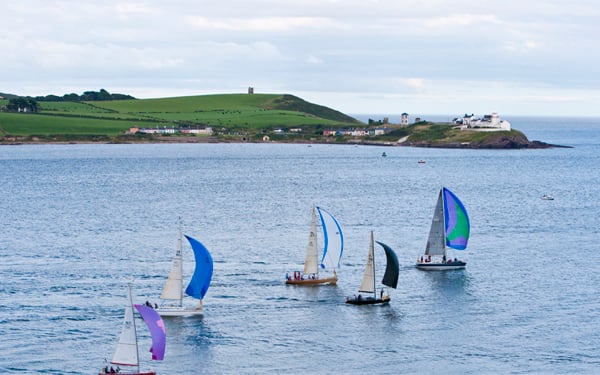
West Cork bound. Photo: Robert Bateman
Compared with their companions from the previous night, the five White Sail boats that started from Kinsale on Saturday morning had an uneventful long slog to Schull where Bryan Heffernans 'Aisling' took first ahead of Doherty and Co in 'Free Spirit' and Julian Dockery's 'Flying Fish',while Kieran Dwyer's 'Brazen Huzzie' was the sole finisher in White Sail Two.
On Sunday the Wind Gods totally deserted Schull, where Race Officer Neill Prendeville was finally forced to fly the abandonment flag after a four hour postponement.
60 Confirmed for Calves Week
With over 60 confirmed entries at present, the 2010 Calves Week in Schull, is hoped to top the 80 boat mark for the annual West Cork festival of sailing. This year’s event will feature racing for eight cruiser classes, together with the growing West Cork 1720 fleet of sportsboats. The week long sailing event is once again supported by the local business community together with sponsorship from Saab, Airtech Security and A&L Castors.
Due to the dramatic increase in numbers, the White Sail fleet will be split into two, with a cut off point of approximately 35ft. Both fleets will begin the series in Kinsale, where they will start a daylight race to Schull at 8pm on Saturday morning July 31st.
The cruiser fleets in classes Zero, 1 and 2 will start the traditional Crosshaven / Fastnet/Schull overnight race at an earlier time of 19.30 on Friday 30th from the Weavers Point line, while classes 3 and 4 will sail a shorter course direct to Schull. The opening reception and briefing has been moved from the event headquarters at the Fastnet Marine Centre, to the Harbour View Hotel in Schull at 8.00 pm on Saturday 31st, which will also host the final overall presentation of prizes, on Sunday Aug 8th.
The first race from Schull will start on Sunday 1st Aug. , when the fleets will sail a variety of courses, which will all finish in Baltimore in the late afternoon. Some of the boats will stay overnight, for Monday’s regatta with the full fleet again resuming for battle in Schull on Tuesday morning, where a costal race is scheduled. On Wednesday the fleet sail to Cape Clere Island for the fun regatta of the week.
The racing boats will anchor in South Harbour, while the support crafts will tie up in North Harbour. This infamous event is run by the secret committee of the Cape Clere Yachting Association and has always proved to be the ideal location for the crews to “leave their hair down”
On Thursday the racing returns to Schull, with a mid week presentation of trophies in the Coartyard on main street, while on Friday the fleet round the Fastnet Rock with a finish in Crookhaven, where some of the boats remain overnight for the following days regatta. The exhausting week finally concludes on Sunday 8th with Schull Regatta, where racing will take place on a variety of courses in Roaring Water Bay, with the closing ceremony and overall presentation of trophies at 8.00 pm
1720s make Calves Week Comeback
With over 60 confirmed entries at present, the 2010 Calves Week in Schull is expected to top the 80 boat mark for the annual West Cork festival of sailing. The week long sailing event is once again supported by the local business community together with sponsorship from Saab, Airtech Security and A&L Castors.
This year’s event will feature racing for eight cruiser classes, together with the growing West Cork 1720 fleet of sportsboats
Due to the dramatic increase in numbers, the White Sail fleet will be split into two, with a cut off point of approximately 35ft. Both fleets will begin the series in Kinsale, where they will start a daylight race to Schull at 8am on Saturday morning July 31st.
The cruiser fleets in Classes Zero, 1 and 2 will start the traditional Crosshaven/ Fastnet/Schull overnight race at an earlier time of 19.30 on Friday 30th from the Weavers Point line, while Classes 3 and 4 will sail a shorter course direct to Schull.
The opening reception and briefing has been moved from the event headquarters at the Fastnet Marine Centre to the Harbour View Hotel in Schull and will take place at 8.00 pm on Saturday 31st, and this venue will also host the final overall presentation of prizes on Sunday August 8th.
The first race from Schull will start on Sunday 1st August when the fleets will sail a variety of courses which will all finish in Baltimore in the late afternoon. Some of the boats will stay overnight for Monday’s regatta with the full fleet again resuming for battle in Schull on Tuesday morning where a costal race is scheduled.
On Wednesday the fleet will sail to Cape Clere Island for the fun regatta of the week. The racing boats will anchor in South Harbour while the support craft will tie up in North Harbour. This infamous event is run by the secret committee of the Cape Clere Yachting Association and has always proved to be the ideal location for the crews to “leave their hair down”
On Thursday the racing returns to Schull with a mid week presentation of trophies in the Courtyard on main street, while on Friday the fleet will round the Fastnet Rock with a finish in Crookhaven, where some of the boats remain overnight for the following days regatta.
The exhausting week will finally conclude on Sunday August 8th with Schull Regatta where racing will take place on a variety of courses in Roaring Water Bay, with the closing ceremony and overall presentation of trophies at 8.00 pm at the Harbour View Hotel.
Calves Week Entry Open
Cork Week's underway, but already its western neighbours are looking ahead to further down the schedule to Calves Week, with already
Schull Harbour Sailing Club has launched its programme of events for the 2010 Calves Week Regatta. Calves Week 2010 will run from Friday 30th July to Sunday August 8th, and comprises of ten races, including the Cape Clear regatta fun event.
Entrants are advised to sign up on-line at www.shsc.ie, as there is a maximum capacity of 100 boats. The event's Facebook page is HERE.
Calves Week is one of Ireland’s best loved sailing and festival weeks, matching competitive racing with a convivial atmosphere, all set against the backdrop of West Cork’s stunning scenery and iconic Fastnet lighthouse. Every year it attracts entrants from around the country, and a few from overseas, with Dublin and Cork clubs being well represented.
The first race is a feeder event, with boats racing overnight from Crosshaven and Kinsale to Schull. Racing begins in earnest with the Schull to Baltimore race on Sunday, continuing with races every day, culminating in the Schull Regatta on Sunday 8th August. Calves week offers the participants a wonderful opportunity of enjoying the magnificent coastal scenery, competitive racing and lots of fun and craic at the onshore events.


























